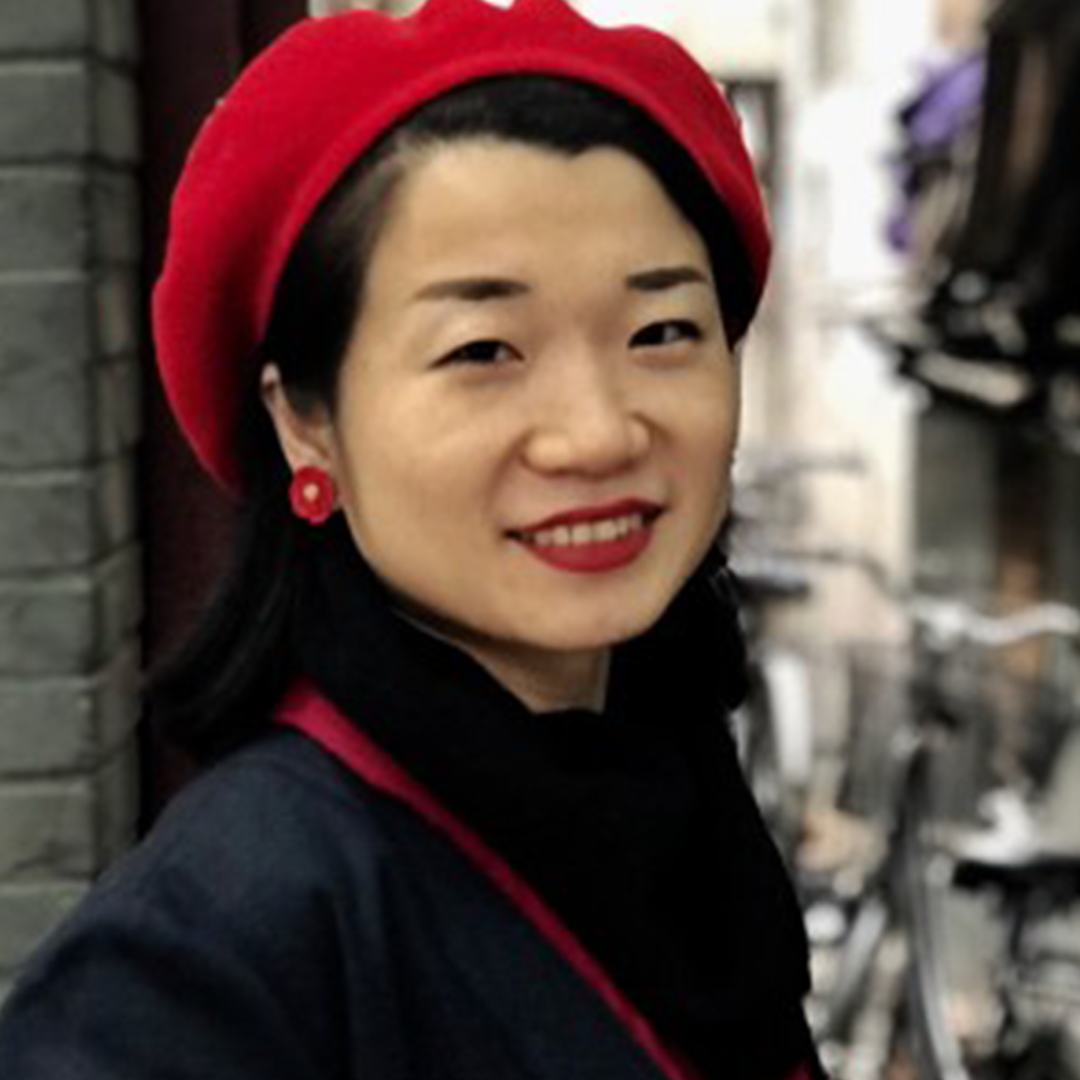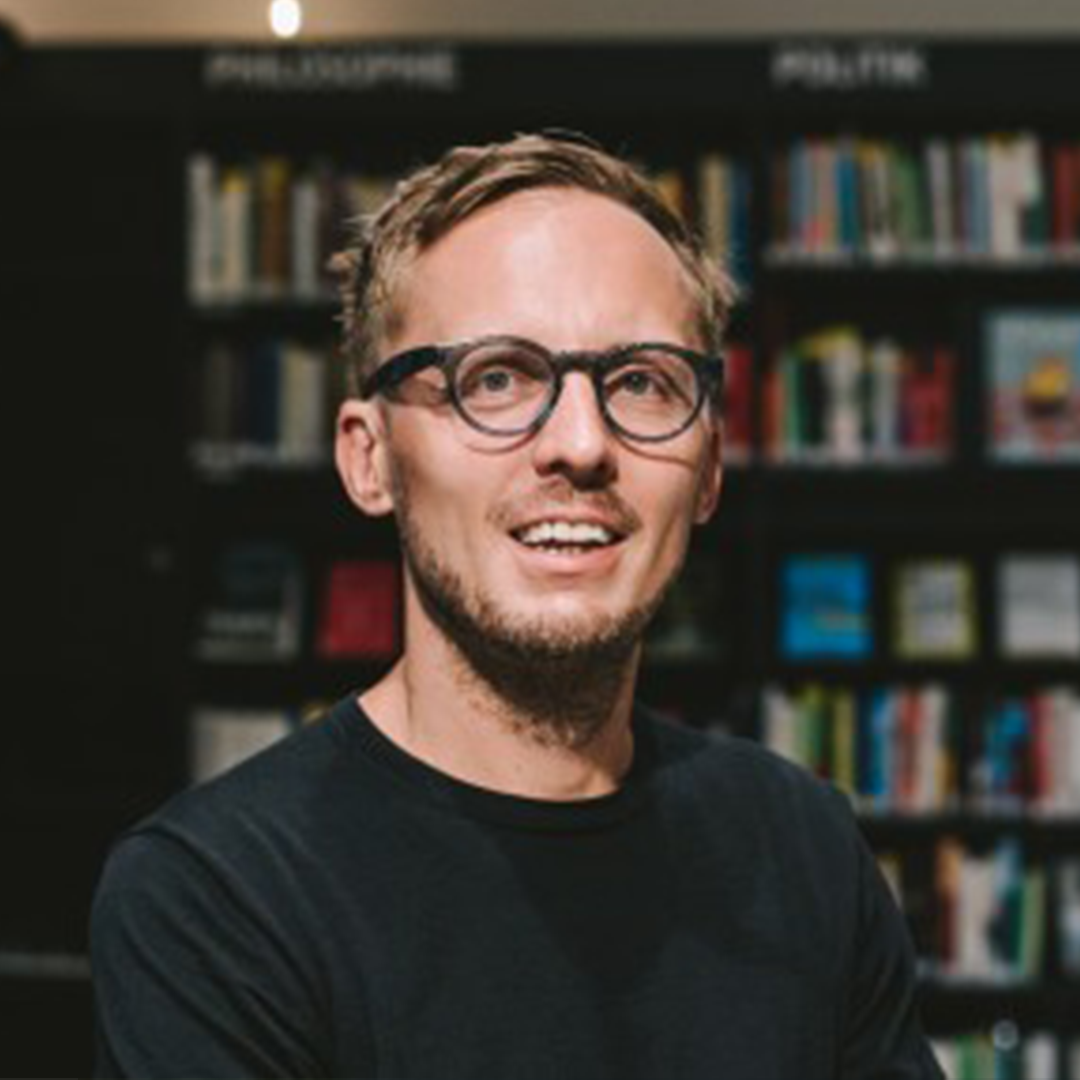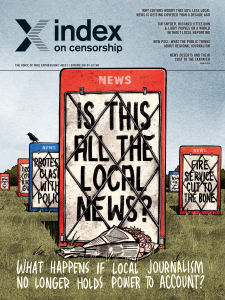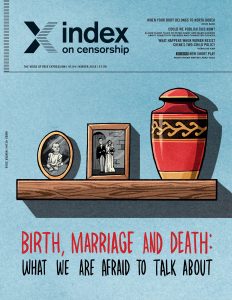Is this all the local news?
FEATURING

Karoline Kan
Writer

Michal Hvorecký
Novelist

Andrew Morton
Author
FEATURING

Writer

Novelist

Author
[vc_row][vc_column][vc_custom_heading text=”Worrying about a local newspaper closing or reporters being centralised is not just nostalgia, it’s being concerned that our democratic watchdogs are going missing, says Rachael Jolley in the spring 2019 issue of Index on Censorship magazine” google_fonts=”font_family:Libre%20Baskerville%3Aregular%2Citalic%2C700|font_style:400%20italic%3A400%3Aitalic”][vc_column_text]

Is this all the local news? The spring 2019 issue of Index on Censorship magazine.
[/vc_column_text][vc_row_inner][vc_column_inner width=”1/4″][vc_icon icon_fontawesome=”fa fa-quote-left” color=”custom” size=”xl” align=”right” custom_color=”#dd3333″][/vc_column_inner][vc_column_inner width=”3/4″][vc_custom_heading text=”Proper journalism cannot be replaced by people tweeting their opinions and the occasional photo of a squirrel, no matter how amusing the squirrel might be” font_container=”tag:h3|text_align:left” google_fonts=”font_family:Libre%20Baskerville%3Aregular%2Citalic%2C700|font_style:400%20italic%3A400%3Aitalic”][/vc_column_inner][/vc_row_inner][vc_column_text]
[/vc_column_text][vc_column_text]
[/vc_column_text][/vc_column][/vc_row][vc_row][vc_column][vc_column_text]
[/vc_column_text][/vc_column][/vc_row][vc_row][vc_column width=”1/3″][vc_custom_heading text=”Is this all the local news?” font_container=”tag:h3|text_align:left” link=”url:https%3A%2F%2Fwww.indexoncensorship.org%2F2019%2F03%2Fmagazine-is-this-all-the-local-news%2F|||”][vc_column_text]The spring 2019 issue of Index on Censorship magazine asks Is this all the local news? What happens if local journalism no longer holds power to account?
With: Libby Purves, Julie Posetti and Mark Frary[/vc_column_text][/vc_column][vc_column width=”1/3″][vc_row_inner][vc_column_inner][vc_single_image image=”105481″ img_size=”full” onclick=”custom_link” link=”https://www.indexoncensorship.org/2019/03/magazine-is-this-all-the-local-news/”][/vc_column_inner][/vc_row_inner][/vc_column][vc_column width=”1/3″][vc_custom_heading text=”Subscribe” font_container=”tag:h3|text_align:left”][vc_row_inner][vc_column_inner][vc_column_text]In print, online. In your mailbox, on your iPad.
Subscription options from £18 or just £1.49 in the App Store for a digital issue.
Every subscriber helps support Index on Censorship’s projects around the world.
![]() SUBSCRIBE NOW[/vc_column_text][/vc_column_inner][/vc_row_inner][/vc_column][/vc_row]
SUBSCRIBE NOW[/vc_column_text][/vc_column_inner][/vc_row_inner][/vc_column][/vc_row]
[vc_row][vc_column][vc_column_text]

Maria Ressa is CEO and Executive Editor of Rappler.com
Index on Censorship condemns the arrest of journalist and Rappler chief executive Maria Ressa by Philippines authorities and calls on the UK to make good on its promises to defend media freedom globally by calling for her release.
“The UK Foreign Office has made media freedom its flagship campaign for 2019. Jeremy Hunt must make good on his promises to champion media freedom worldwide by showing that the actions of the Philippines authorities are unacceptable,” said Jodie Ginsberg, chief executive of Index on Censorship, a freedom of expression campaign group.
Ressa was arrested in connection with a story published by her news outlet in May 2012. Officers from the National Bureau of Investigation arrested Rappler CEO and executive editor Maria Ressa early Wednesday evening, February 13, in connection with a cyber libel case filed by the Philippines justice department, according to Rappler.
Maria Ressa is one of the judges for this year’s Index on Censorship’s Freedom of Expression Awards and featured in the 2018 autumn edition of Index on Censorship magazine.[/vc_column_text][vc_basic_grid post_type=”post” max_items=”4″ element_width=”6″ grid_id=”vc_gid:1550060728999-3fa7b40d-3dd0-2″ taxonomies=”6534″][/vc_column][/vc_row]
[vc_row][vc_column][vc_custom_heading text=”Vital moments during our lifetimes are complicated by taboos about what we can and can’t talk about, and we end up making the wrong decisions just because we don’t get the full picture, says Rachael Jolley in the winter 2018 issue of Index on Censorship magazine” google_fonts=”font_family:Libre%20Baskerville%3Aregular%2Citalic%2C700|font_style:400%20italic%3A400%3Aitalic”][vc_column_text]

Birth, Marriage and Death, the winter 2018 issue of Index on Censorship magazine.
[/vc_column_text][vc_row_inner][vc_column_inner width=”1/4″][vc_icon icon_fontawesome=”fa fa-quote-left” color=”custom” size=”xl” align=”right” custom_color=”#dd3333″][/vc_column_inner][vc_column_inner width=”3/4″][vc_custom_heading text=”Taboos, especially around death and illness, can stop people asking for help or finding support in times of crisis” font_container=”tag:h3|text_align:left” google_fonts=”font_family:Libre%20Baskerville%3Aregular%2Citalic%2C700|font_style:400%20italic%3A400%3Aitalic”][/vc_column_inner][/vc_row_inner][vc_column_text]
[/vc_column_text][/vc_column][/vc_row][vc_row][vc_column][vc_column_text]
[/vc_column_text][/vc_column][/vc_row][vc_row][vc_column width=”1/3″][vc_custom_heading text=”Birth, Marriage and Death” font_container=”tag:h3|text_align:left” link=”url:https%3A%2F%2Fwww.indexoncensorship.org%2F2018%2F12%2Fbirth-marriage-death%2F|||”][vc_column_text]The winter 2018 issue of Index on Censorship magazine explores taboos surrounding birth, marriage and death. What are we afraid to talk about?
With: Liwaa Yazji, Karoline Kan, Jieun Baek[/vc_column_text][/vc_column][vc_column width=”1/3″][vc_row_inner][vc_column_inner][vc_single_image image=”104225″ img_size=”full” onclick=”custom_link” link=”https://www.indexoncensorship.org/2018/12/birth-marriage-death/”][/vc_column_inner][/vc_row_inner][/vc_column][vc_column width=”1/3″][vc_custom_heading text=”Subscribe” font_container=”tag:h3|text_align:left”][vc_row_inner][vc_column_inner][vc_column_text]In print, online. In your mailbox, on your iPad.
Subscription options from £18 or just £1.49 in the App Store for a digital issue.
Every subscriber helps support Index on Censorship’s projects around the world.
![]() SUBSCRIBE NOW[/vc_column_text][/vc_column_inner][/vc_row_inner][/vc_column][/vc_row]
SUBSCRIBE NOW[/vc_column_text][/vc_column_inner][/vc_row_inner][/vc_column][/vc_row]